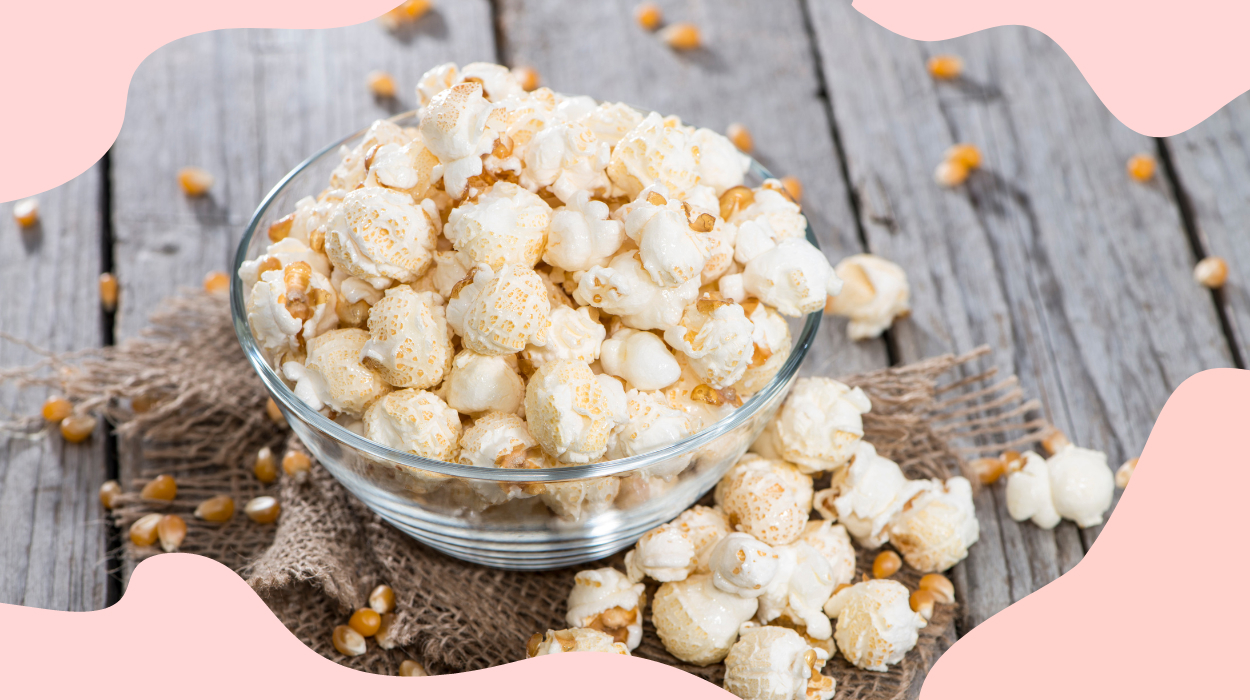Is Popcorn Inflammatory? The Connection You May Not Know In 2024

Popcorn is a snack enjoyed by many, whether you’re watching TV or cheering in a crowd at a stadium. While generally considered a healthy snack option, there have been some concerns about whether popcorn causes inflammation. So, is popcorn inflammatory?
Potentially. But it depends on the popcorn type and how it is prepared. So before you swear off eating popcorn for good, it’s essential to understand what type of popcorn causes inflammation and how to avoid it.
Here’s everything you need to know about the relationship between popcorn and inflammation and how to minimize these effects.
Does Popcorn Cause Inflammation?
Popcorn can cause inflammation. But it depends on the type of popcorn you eat. Many kinds of microwavable popcorn are high in sodium, saturated fat, and other additives that are linked to inflammation.
However, plain, air-popped popcorn is unlikely to cause inflammation in most people. In fact, it is rich in antioxidants, whole grains, and fiber, which may help fight inflammation and protect against chronic disease. Plain popcorn is also low in calories, which may help with weight management.
Is Popcorn An Inflammatory Food?
Before determining if popcorn is an inflammatory food, let’s first define inflammation and look at the types of food and ingredients known to cause it.
Inflammation[1] is the body’s immune response to injury or illness. While it is typically thought of negatively, small amounts of inflammation are necessary for the body to heal.[2] Under normal circumstances, the inflammation resolves once the body is healed.
However, with chronic inflammation,[2] the inflammatory process often begins without injury and doesn’t end as it should. This can lead to chronic diseases[1] such as diabetes, heart disease, obesity, non-alcoholic liver disease, autoimmune disorders, and depression.
Among the causes of chronic inflammation, stress and diet play a critical role. For example, fiber, omega-3 fatty acids, and antioxidants have been linked to a decrease in markers of inflammation.[3] In contrast, high amounts of processed foods with saturated fat, sodium, added sugar,[4] and trans fats[5] have been linked to inflammation.
With that said, popcorn itself, with its high content of fiber and antioxidants, is unlikely to cause inflammation. However, not all popcorn is created equal.
When Can Popcorn Cause Inflammation?
Some types of popcorn may lead to inflammation and should not be included in an anti-inflammatory meal plan. For example, many popular methods of preparing popcorn involve using pro-inflammatory ingredients. These may include oils, butter, salt, and other additives.
Oils high in omega-6 fatty acids are linked to chronic inflammation.[6] Examples of these inflammatory oils include soybean oil, corn oil, sunflower oil, and safflower oil. Butter[7] has a high saturated fat content and is also associated with inflammation.
Microwave popcorn, in particular, tends to be high in saturated fat and sodium, which are common culprits of inflammation. Furthermore, some popcorn varieties, such as kettle corn, contain added sugar or even artificial sweeteners,[8] which have been linked to inflammation.
Use a hot air popper to make your own popcorn at home without oils or flavorings. You can also cook it over the stove using healthy oils like extra virgin olive and avocado.
Who Should Avoid Popcorn?
Popcorn is not recommended for children under the age of four.[9] Additionally, people with Crohn’s disease,[10] which causes irritation and inflammation in the digestive tract, should also avoid popcorn. Its high fiber content may be difficult to digest, triggering symptoms like diarrhea and cramping.
Benefits Of Popcorn When You Eat It Properly
We know that when eaten in moderation, popcorn alone is unlikely to cause inflammation flare-ups. But is eating popcorn good for reducing inflammation? Is popcorn healthy?
Possibly. Here’s a quick look at the health benefits of popcorn.
Rich In Antioxidants
Antioxidants help protect our cells from the damage caused by free radicals. Free radicals are unstable molecules that can cause oxidative stress, leading to inflammation.[11]
Popcorn is rich in polyphenols,[12] antioxidants associated with improved digestion and blood circulation. Polyphenols may also reduce the risk of certain types of cancer.
Because of the antioxidant properties of polyphenols, studies suggest they may be promising for preventing and reducing inflammation[13] in the body. To increase its inflammation-fighting potential and add flavor variety, consider topping popcorn with other anti-inflammatory ingredients. These toppings may include black pepper, dark chocolate chips, turmeric, oregano, rosemary, or cinnamon.
Good Source Of Whole Grains And Fiber
Popcorn is 100% whole grain[14] by weight when eaten plain and air-popped. Whole grains provide vitamins, minerals, fiber, and other nutrients that can reduce the risk of chronic disease.
Fiber,[15] in particular, is important for blood sugar control, digestive health, and weight management. It can also reduce your risk of developing heart disease.
Adults should aim to consume 22 to 34 grams[15] of fiber each day. The specific amount you need will depend on your sex and age. A three-cup serving[16] of air-popped popcorn provides around 15% of the fiber most healthy adults need daily.
Weight Loss
When combined with a healthy diet, popcorn may support weight loss. Three cups of plain, air-popped popcorn have around 100 calories.[17] This makes it a healthy snack option for those on weight loss diets who prefer high-volume snacks.
High-fiber foods like popcorn can increase satiety[12] more than sweets and fatty foods with the same calorie content. This filling snack can help reduce the total amount of calories you eat in a day, leading to weight loss.
Anti-Inflammatory Snacks For You
In addition to plain popcorn, here is a list of nutritious foods with the highest amounts of anti-inflammatory compounds:[18]
- Berries.
- Dark chocolate.
- Sweet potatoes.
- Raw carrots.
- Veggies and bean dip.
- Black olives.
- Plums.
- Anti-inflammatory greens juice.
- Pomegranate juice.
- Pecans and other nuts.
- Grapes.
- Whole grain toast with nut butter or avocado.
You can also take anti-inflammatory supplements, which may help reduce inflammation and inflammation-related pain.
Inflammatory Snacks To Avoid
The following foods and snacks[5] have the potential to promote inflammation in some individuals:
- Processed meats, such as sausage, deli meat, and bacon.
- Refined carbs, such as white bread, cereals, and chips.
- Grain-fed red meat, like hamburgers or steak.
- Fatty cuts of meat, like chicken with the skin on and pork.
- Baked goods, such as cookies, cakes, pies, and brownies.
- Fried foods like french fries, onion rings, and donuts.
- Fruit juice with added sugars.
- Full-fat dairy products like cheese, butter, and cream.
- Frozen pizza.
- High-sugar granola bars.
Final Thought
Many microwaveable and pre-packaged popcorn varieties may trigger inflammation. This is primarily because they are high in sodium, saturated fat, and other additives.
However, consuming plain, air-popped popcorn alone is unlikely to cause inflammation. In fact, popcorn contains antioxidants, fiber, and other good-for-you nutrients that may help prevent inflammation and improve your health.
Drizzle plain popcorn with olive oil and top it with pepper, turmeric, rosemary, or oregano to increase its anti-inflammatory power. And if you have questions about popcorn and your individualized nutrition needs, consider meeting with your registered dietitian nutritionist.
+ 18 sources
Health Canal avoids using tertiary references. We have strict sourcing guidelines and rely on peer-reviewed studies, academic researches from medical associations and institutions. To ensure the accuracy of articles in Health Canal, you can read more about the editorial process here
- Dimitratos, S. (2018). Inflammation: What Is It, and how can my diet and behavior affect it? [online] American Society for Nutrition. Available at: https://nutrition.org/inflammation-what-is-it-and-how-can-my-diet-and-behavior-affect-it/
- National Cancer Institute. (2015). Risk Factors: Chronic Inflammation. [online] Available at: https://www.cancer.gov/about-cancer/causes-prevention/risk/chronic-inflammation
- Hess, J.A., Stephensen, C.B., Kratz, M. and Bolling, B.W. (2021). Exploring the Links between Diet and Inflammation: Dairy Foods as Case Studies. [online] 12, pp.1S13S. doi:https://doi.org/10.1093/advances/nmab108.
- Ma, X., Nan, F., Liang, H., Shu, P., Fan, X., Song, X., Hou, Y. and Zhang, D. (2022). Excessive intake of sugar: An accomplice of inflammation. [online] 13, pp.988481–988481. doi:https://doi.org/10.3389/fimmu.2022.988481.
- Eating to Reduce Inflammation. (n.d.). Available at: https://www.va.gov/WHOLEHEALTH/veteran-handouts/docs/EatReduceInflam__Final508__07-25-2019.pdf.
- DiNicolantonio, J.J. and O’Keefe, J.H. (2018). Omega-6 vegetable oils as a driver of coronary heart disease: the oxidized linoleic acid hypothesis. [online] 5(2), pp.e000898–e000898. doi:https://doi.org/10.1136/openhrt-2018-000898.
- Fritsche, K.L. (2015). The Science of Fatty Acids and Inflammation. [online] 6(3), pp.293S301S. doi:https://doi.org/10.3945/an.114.006940.
- Debras, C., Eloi Chazelas, L. Sellem, Porcher, R., Druesne-Pecollo, N., Younes Esseddik, Fabien, Cédric Agaësse, Alexandre De Sa, Lutchia, R., Léopold Fezeu, Julia, C., Emmanuelle Kesse-Guyot, Allès, B., Galan, P., Serge Hercberg, Touvier, M., Huybrechts, I., Srour, B. and Touvier, M. (2022). Artificial sweeteners and risk of cardiovascular diseases: results from the prospective NutriNet-Santé cohort. [online] pp.e071204–e071204. doi:https://doi.org/10.1136/bmj-2022-071204.
- dcf.wisconsin.gov. Foods Not Recommended for Children Under 4 Years of Age. [online] Available at: https://dcf.wisconsin.gov/files/ccic/pdf/foods-not-recommended.pdf
- and, D. (2023). Eating, Diet, & Nutrition for Crohn’s Disease. [online] National Institute of Diabetes and Digestive and Kidney Diseases. Available at: https://www.niddk.nih.gov/health-information/digestive-diseases/crohns-disease/eating-diet-nutrition
- Hussain, T., Tan, B., Yin, Y., François Blachier, Carine, M. and Najma Rahu (2016). Oxidative Stress and Inflammation: What Polyphenols Can Do for Us? [online] 2016, pp.1–9. doi:https://doi.org/10.1155/2016/7432797.
- www.heart.org. (2019). Popcorn as a snack: Healthy hit or dietary horror show? [online] Available at: https://www.heart.org/en/news/2019/06/18/popcorn-as-a-snack-healthy-hit-or-dietary-horror-show
- Singh, A., Yu Ying Yau, Leung, K.K., Hani El-Nezami and Jetty Chung-Yung Lee (2020). Interaction of Polyphenols as Antioxidant and Anti-Inflammatory Compounds in Brain–Liver–Gut Axis. [online] 9(8), pp.669–669. doi:https://doi.org/10.3390/antiox9080669.
- Coco, M. and Vinson, J.A. (2019). Analysis of Popcorn (Zea mays L. var. everta) for Antioxidant Capacity and Total Phenolic Content. [online] 8(1), pp.22–22. doi:https://doi.org/10.3390/antiox8010022.
- CDC (2022). Fiber: The Carb That Helps You Manage Diabetes . [online] Centers for Disease Control and Prevention. Available at: https://www.cdc.gov/diabetes/library/features/role-of-fiber.html
- Usda.gov. (2023). FoodData Central. [online] Available at: https://fdc.nal.usda.gov/fdc-app.html#/food-details/170246/nutrients
- Usda.gov. (2022). Popcorn: A Healthy, Whole Grain Snack : USDA ARS. [online] Available at: https://www.ars.usda.gov/plains-area/gfnd/gfhnrc/docs/news-2012/popcorn-a-healthy-whole-grain-snack/
- Stromsnes, K., Correas, Á.G., Lehmann, J., Juan Pablo Gambini and Alberola, A. (2021). Anti-Inflammatory Properties of Diet: Role in Healthy Aging. [online] 9(8), pp.922–922. doi:https://doi.org/10.3390/biomedicines9080922.



